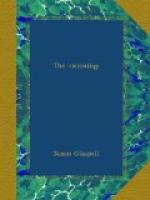She looked for a name in the books, but found none. The fly-leaves had been torn out.
She was not sorry; she was just as glad to go on thinking of her trouble-maker as the man who mended the boats. There was something freeing about keeping him impersonal.
But in the book about women she found an envelope addressed: “To one looking for trouble.”
This was what was type-written on the single sheet it contained:
“Here are a couple of books warranted to disturb one’s peace of mind. They are marked danger as both warning and commendation. It is absolutely guaranteed that one will not be so pleased with the world—and with one’s self—after reading them. There is more—both books and danger—where they came from.”
It was signed: “One who loves to lead adventurous souls into dangerous paths.”
It was two o’clock when Katie turned off her light that night.
CHAPTER XVI
Perhaps after all it was neither the dog nor the literature, but the heat. For the heat of that next day was the kind to prey through countries of make-believe. It oppressed every one, but Ann it seemed to excite, as if it stirred memories in their sleep. “Don’t fight heat, Ann,” Katie finally admonished, puzzled and disturbed by the way Ann kept moving about. “The only way to get ahead of the heat is to give up to it.”
“Can you always do what you want to do?” Ann demanded with a touch of petulance. “Isn’t there ever something makes you do things you know aren’t the things to do?”
“Oh, dear me, yes,” laughed Kate. “But you’re simply your own worst enemy when you try to get ahead of the heat.”
“I don’t know how you’re going to help being your own worst enemy,” Ann murmured.
She picked some leaves from the vines and threw them away, purposelessly; she made the cat get out of a chair and sat down in it herself, only to get up again and pile all the magazines in a different way, not facilitating anything by the change. Then, after walking the length of the veranda, she stood there looking at Katie: Katie in the coolest and coolest-looking of summer dresses, leaning back in a cool-looking chair—adjusting herself to things as they were, poised, victorious in her submission.
Then Ann said a strange thing. “A hot day’s just nothing but a hot day to you, is it?”
The words themselves said less than the laugh which followed them—a laugh which carried both envy and resentment, which at once admired and accused, a laugh straight from the girl they were trying to ignore.
And pray what was a hot day to her, Katie wondered. What was a hot day—save a hot day? But as she watched Ann in the next few moments she seemed to be surveying a figure oppressed less by heat than by that to which the heat laid her open. It seemed that the hot day might stand for the friction and the fretting of the world, for things which closed in upon one as heat closed in, bore down as heat bore down. As Ann pushed back the hair from her forehead it seemed she would push back the weight of the years.




